In the digital marketplace, visibility is currency, and the key to visibility is mastering the art of keyword research. This vital component of SEO helps businesses understand their audience’s search behavior, ensuring that their digital content aligns with what potential customers are seeking. The challenge lies not in recognizing the value of keyword research, but in finding the right tools to execute it effectively.
Identifying the best keyword research tools can transform your SEO strategy, offering insights into search trends, competition, and user intent. By equipping small enterprises with these powerful resources, they can strategically optimize their online presence to boost visibility and attract more targeted traffic.
Table of Contents
What is Keyword Research?
Keyword research is the foundation of SEO, where businesses discover the terms and phrases potential customers use in search engines. This strategic process goes beyond looking for high-volume search terms—it’s about understanding the searcher’s intent and the context of their queries.
Effective keyword research involves not only the initial discovery but also ongoing analysis to adapt to market trends and search algorithm updates. With the best keyword research tools, small businesses can identify opportunities to reach customers more effectively and craft content that aligns with user searches, ultimately improving their online visibility and engagement.
Why Small Businesses Need Specialized SEO Tools
The online digital landscape is saturated with businesses vying for the top spot on search engines. For a small business, the competition can often feel overwhelming, especially when pitted against large corporations with vast resources. This underscores the significance of the best SEO tools for small businesses. These tools can help level the playing field and ensure that even small enterprises can get their fair share of online visibility.
1. Budget Constraints: Unlike larger companies, small businesses often operate on tight budgets. Specialized SEO tools tailored for them ensure that they get the most bang for their buck, offering essential features at an affordable price.
2. Limited Manpower: With a smaller team, small businesses can’t always afford to have a dedicated SEO expert on staff. Specialized tools often come with user-friendly interfaces and tutorials, making it easier for non-experts to grasp the nuances of SEO.
3. Targeted Approach: Small businesses usually cater to niche markets or localized audiences. Specialized SEO tools can offer insights into local search trends, competitor analyses, and more, ensuring that the business reaches its specific target audience effectively.
4. Quick Results: In the fast-paced world of startups and small enterprises, waiting months to see SEO results can be detrimental. The best SEO tools for small businesses are designed to provide quick insights, actionable recommendations, and trackable results.
5. Adaptability: The digital landscape is ever-evolving, with search engine algorithms constantly updating. Small businesses need agile and adaptable tools that can quickly pivot, ensuring they remain compliant with best practices and maintain their online rankings.
While SEO is essential for businesses of all sizes, it’s crucial for small businesses to leverage specialized tools tailored for their unique challenges. By utilizing these SEO tools, they can ensure a robust online presence, effectively reach their target audience, and achieve sustainable growth in the digital marketplace.
Key Steps in Performing Keyword Research
- Identify Your Topics: Start by defining the core topics relevant to your business. These should reflect what you offer and what your target audience is seeking.
- Generate Keyword Ideas: Use your topics to brainstorm potential keywords. Think about the search terms your customers might use.
- Use Keyword Research Tools: Employ the best keyword research tools to expand your list with suggestions and gather data on search volume and competition.
- Study Search Intent: Determine the intent behind the keywords—whether users are looking to buy, learn, or find a specific website.
- Analyze the Competition: Look at the keywords your competitors rank for. Identify gaps and opportunities for your content strategy.
- Select the Right Keywords: Choose keywords that balance high search volume with low competition, and align with your business goals.
- Refine and Evolve: Regularly review and update your keyword list to adapt to new search trends and maintain relevance in search results.
Keyword Research Tools
Navigating the vast ocean of keywords requires reliable tools, especially for small businesses aiming to make a big impact. The best keyword research tools unlock a world of data-driven insights, allowing these businesses to target with precision and rise above the noise. Here’s a roundup of standout tools that cater to various needs and budgets.
1. Ubersuggest
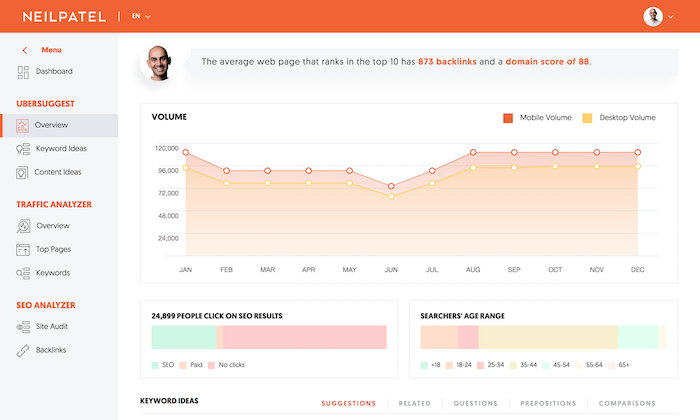
Created by the renowned digital marketer Neil Patel, Ubersuggest is a free tool perfect for small businesses. It provides keyword ideas, search volume, competition data, and even suggests content ideas.
Ubersuggest offers not just keyword suggestions but also a peek into backlink data and a site audit feature. Its visual keyword trend graph is particularly handy for identifying the seasonality or rising popularity of certain terms.
Why it’s great for small businesses:
Cost-effective (with a free version) and paid versions are also much cheaper. It’s user-friendly and provides a comprehensive snapshot of potential keyword opportunities, making it easier for businesses to strategize their content around trending and relevant terms.
Things to Note:
Ubersuggest is recognized for its intuitive interface and a range of SEO functionalities. However, things to note include its limited data depth compared to more premium tools. Some users have also reported occasionally inflated search volume numbers, and the free version comes with distinct usage limitations.
2. SEMrush Keyword Magic Tool
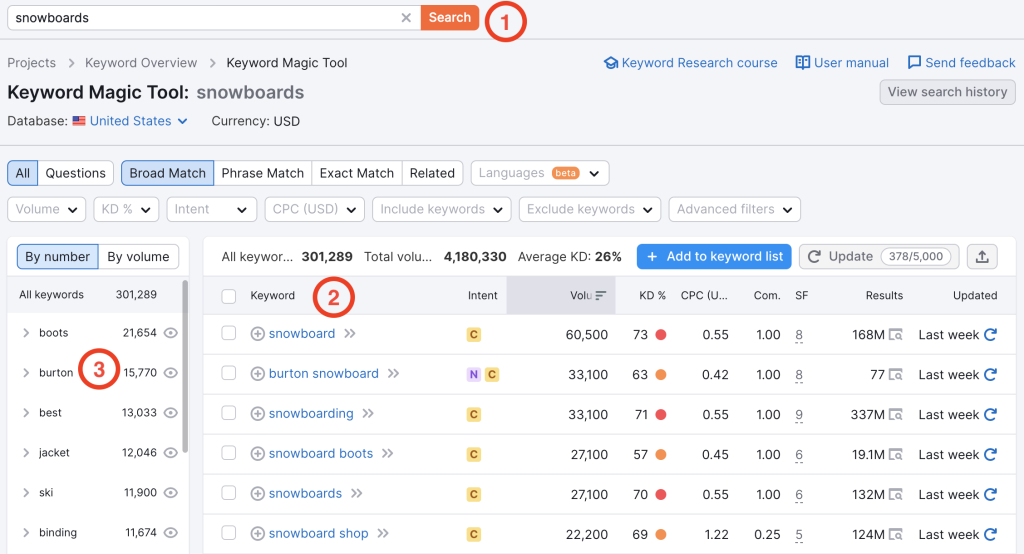
Part of the extensive SEMrush suite, the Keyword Magic Tool offers millions of keyword suggestions, along with detailed metrics like keyword difficulty and click potential.
SEMrush’s tool is more than just for keyword research. It provides a full suite of SEO functionalities, including site audit, backlink analytics, and competitor analysis. Their Keyword Magic Tool is particularly known for its extensive keyword database and easy-to-filter features.
Why it’s great for small businesses:
While SEMrush comes at a cost, its comprehensive data can be invaluable for those willing to invest a bit in their SEO strategy.
Its depth of data ensures that businesses can make informed decisions. While it might be pricier than some other tools, the value it delivers, especially in competitive niches, can be worth the investment.
Things to Note:
SEMrush Keyword Magic Tool stands out with its vast array of features and in-depth keyword data. However, things to note are its potential steep learning curve for newcomers, a price tag that might be steep for some small businesses, and backlink data that some believe isn’t as comprehensive as competitors like Ahrefs.
3. Ahrefs Keywords Explorer
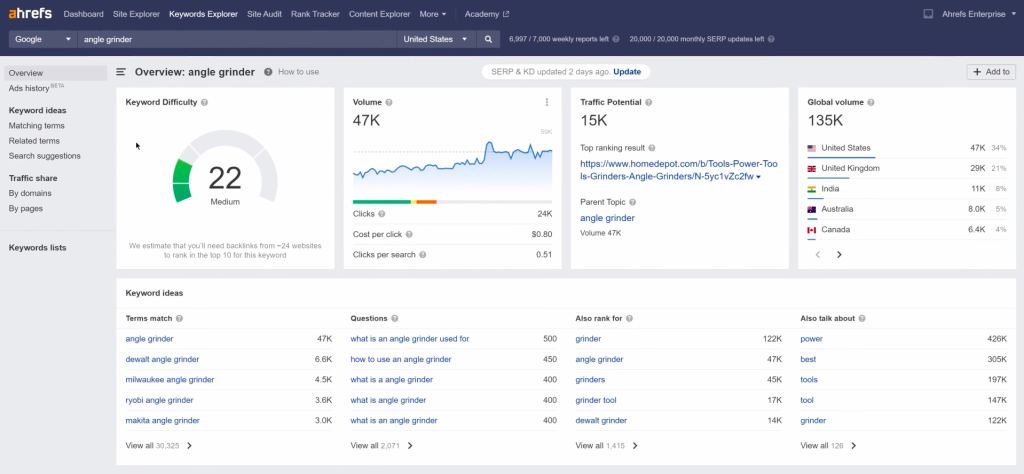
A competitor to SEMrush, Ahrefs is also a comprehensive SEO tool with a powerful keyword explorer feature. It provides extensive data on keyword difficulty, click metrics, and global search volume.
Why it’s great for small businesses:
Its database covers over 10 search engines, including YouTube and Amazon, providing a broad spectrum of keyword insights. Ahrefs offers a visual and straightforward dashboard, making complex data easily digestible. Its backlink database can be a goldmine for small businesses looking to build domain authority through strategic link-building.
Things to Note:
Ahrefs Keywords Explorer covers an impressive spectrum of SEO functionalities. But things to note are its potentially high cost for smaller businesses, a vast array of features that might overwhelm beginners, and occasional discrepancies in its keyword difficulty metrics.
4. KWFinder
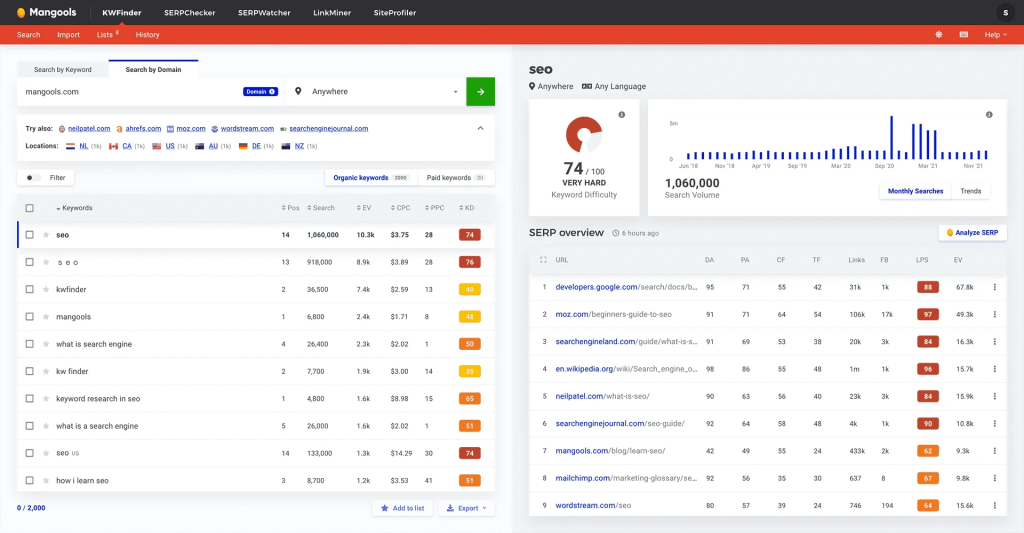
KWFinder focuses on long-tail keywords, which are often less competitive and can drive more targeted traffic. KWFinder provides a look into the historical search volume of keywords, the average cost per click in advertising, and even the potential difficulty of ranking for certain terms.
Why it’s great for small businesses:
It’s user interface is beginner-friendly, making it easier for business owners without an SEO background to navigate and derive insights. It provides a visual representation of keyword trends, and offers insights into what the competition is ranking for.
Things to Note:
KWFinder is favored for its user-friendly interface and emphasis on long-tail keywords. But things to note are the limited keyword suggestions in its free version, data that may not be as exhaustive as in other tools, and its predominant focus on keywords which might necessitate other tools for a more holistic SEO strategy.
5. AnswerThePublic

This unique tool provides questions, prepositions, and comparisons that people are searching for around a specific keyword. By providing visualization of user questions, this tool taps into the actual queries people are inputting into search engines. AnswerThePublic is a goldmine for content creators to address user pain points directly.
Why it’s great for small businesses:
Besides being free, it’s fantastic for content ideation and understanding user intent. It aids in understanding the consumer’s voice and crafting content that addresses direct inquiries, enhancing user engagement and trust.
Things to Note:
AnswerThePublic is unique in its visualization and direct insights into user queries. However, things to note include limitations in daily searches with the free version, a lack of quantitative data such as search volume, and an interface that, while distinctive, might not appeal to everyone
6. Google Keyword Planner
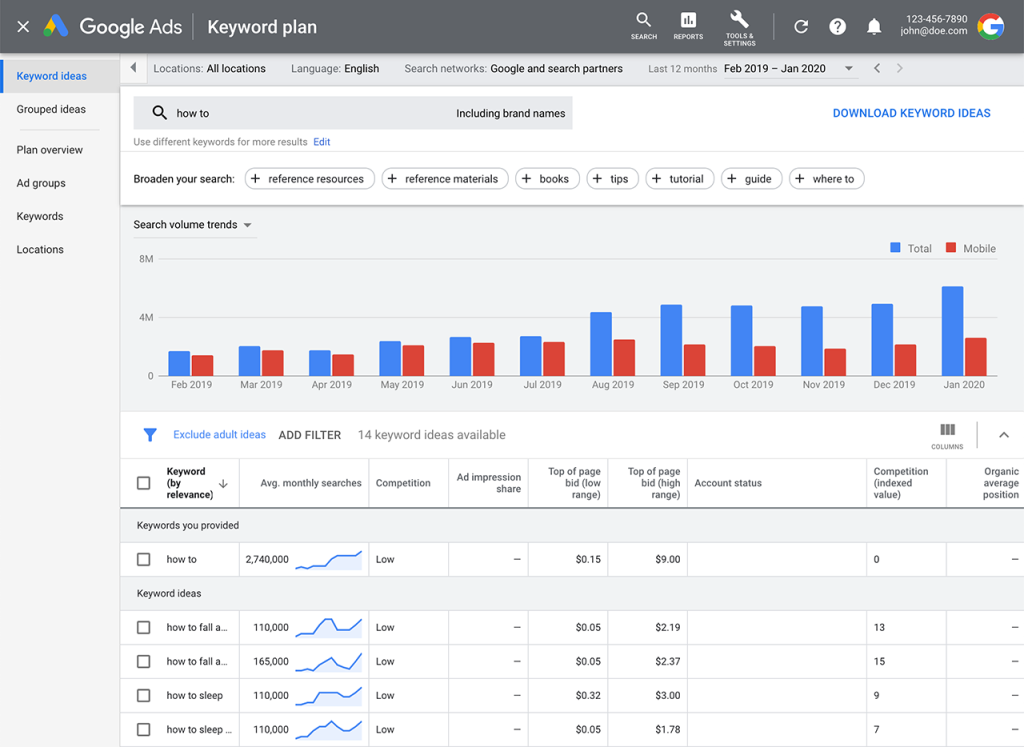
Directly from the search engine giant itself, Google Keyword Planner is a goldmine for keyword research, offering search volume, competition data, and more. While primarily designed for Google Ads campaigns, the Keyword Planner provides reliable data on search volume ranges, competition levels, and even forecasts on keyword performance.
Why it’s great for small businesses:
It’s free, and since it’s from Google, you’re getting data straight from the source, ensuring accuracy.. It’s integrated with Google Ads, so if a business wishes to venture into paid advertising, this tool serves a dual purpose.
Things to Note:
Google Keyword Planner offers reliable data and a direct integration with Google Ads. Yet, things to note include its primary design tailored for advertisers, which can leave some SEO-centric features desired, and the absence of exact search volumes unless you’re actively running a campaign.
7. Moz Keyword Explorer
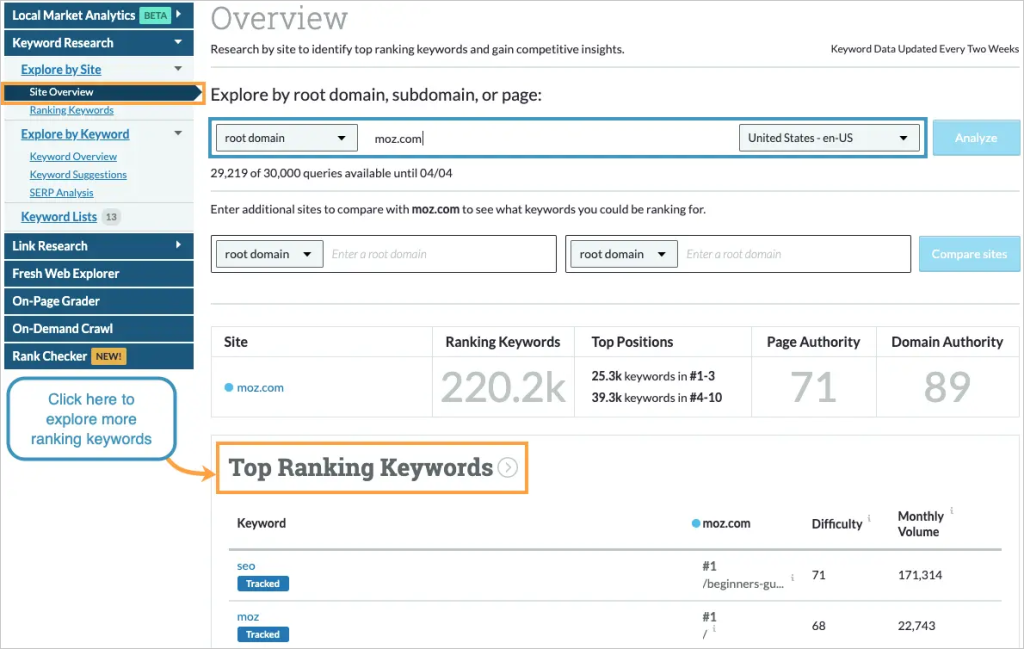
Moz’s tool offers keyword suggestions, SERP analysis, and even measures the organic click-through rate potential of keywords. Beyond keyword exploration, Moz offers an entire suite of SEO tools, including on-page metrics, link-building opportunities, and site audits. The Keyword Explorer is known for its unique “Priority” metric that combines search volume, ranking potential, and competitive metrics into a single score.
Why it’s great for small businesses:
Moz offers a balanced mix of simplicity and depth, making it useful for both SEO beginners and those with a bit more experience. Moz’s intuitive interface and thorough tutorials make it accessible for those new to SEO. The holistic approach means small businesses can cover a lot of SEO ground without juggling multiple tools.
Things to Note:
Moz Keyword Explorer is known for its balance of simplicity and depth. However, things to note are its potentially less comprehensive backlink data compared to tools like Ahrefs, a price tag that might be challenging for startups, and limited monthly queries on its lower-tier plans.
8. Soovle

At its core, Soovle lets users explore keyword suggestions from multiple sources like Google, YouTube, Bing, Amazon, and more, based on a singular input. It’s a way to see user inquiries from various digital angles. Its strength lies in the broad net it casts across different platforms.
Why it’s great for small businesses:
Diversifying keyword research beyond just Google helps businesses tap into a wider audience base, especially if they are active on platforms like YouTube, Amazon, or Bing. This multi-faceted approach can aid in optimizing a brand’s presence not just on Google but on e-commerce platforms, video-sharing sites, and more.
Things to Note:
Soovle offers a multidimensional view of keywords across different platforms. Yet, things to note are its basic features lacking in-depth analysis, no direct integration with website systems, and a primary focus on just providing keyword suggestions without deeper insights.
9. Keywords Everywhere

This browser extension shows keyword data, like search volume and competition, right in your Google search results, making it convenient for quick keyword checks. As a browser extension, Keywords Everywhere overlays keyword data, such as search volume, CPC, and competition, directly onto your search result pages across several platforms including Google, Amazon, and YouTube.
Why it’s great for small businesses:
Being a browser add-on, it seamlessly integrates with your daily browsing without the need to hop onto a separate platform. Small businesses can make on-the-fly decisions about content or product listings without diving into a separate tool.
Things to Note:
Keywords Everywhere seamlessly integrates with daily browsing routines. However, things to note include its limitation as a browser extension, a shift from free to paid which removed some essential insights, and an absence of advanced functionalities found in full platforms.
10. SpyFu
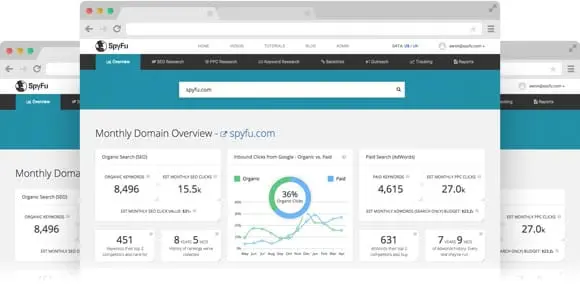
As its name suggests, SpyFu is excellent for competitor keyword research. You can see which keywords your competitors rank for and even find gaps in your own keyword strategy. By inputting a competitor’s website, users can see which keywords they’re targeting, both organically and through ads, and how they rank. Additionally, SpyFu offers data on ad variations used by competitors over several years.
Why it’s great for small businesses:
Knowledge is power. Keeping an eye on competitor moves and understanding market dynamics is crucial. This tool gives that competitive edge. Understanding what keywords competitors are targeting allows small businesses to find gaps in their strategy or double down on areas where they can realistically compete. It can also inspire PPC strategies without the trial-and-error expenses.
Things to Note:
SpyFu offers an edge in understanding competitor moves. But things to note encompass occasional questions on data accuracy, reports that sometimes lack depth, and a user interface that might not resonate with everyone.
Integrating Keywords into Your SEO Strategy
After arming yourself with a potent list of keywords, the next step is to weave them into your SEO blueprint effectively. Here’s how to integrate keywords seamlessly into your strategy:
- Website Optimization: Incorporate keywords into meta titles, descriptions, and URLs to help search engines understand your pages better.
- Content Creation: Use keywords to guide your blog posts, articles, and video content, ensuring they align with the queries your audience is making.
- On-Page SEO: Place keywords strategically in your headers and throughout your page content to signal relevance to search engines without overstuffing.
- Link Building: Utilize keywords in anchor text when building internal links to reinforce the structure of your site and the importance of certain pages.
- Performance Tracking: Monitor how well your keywords are performing in terms of rankings and tweak your strategy to focus on the most effective terms.
Integrating keywords is not a set-and-forget task. It’s about ongoing refinement and ensuring your content remains relevant and discoverable by your target audience.
Wrap-Up
Effective keyword research is the cornerstone of any successful SEO strategy, particularly for small businesses looking to stand out in a competitive digital marketplace. By utilizing the right tools to discover and implement the best keywords, your business can attract more targeted traffic, engage better with your audience, and increase conversions. Remember, SEO is a marathon, not a sprint. Regularly revisit your keyword strategy to keep pace with changing trends and stay ahead of the curve.



